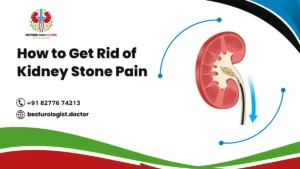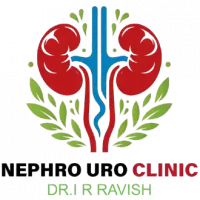They start small—grainy little minerals with big plans. Kidney stones form when your body’s balance of fluids, salts, and minerals goes off track, creating tiny crystals that can grow, move, and hurt. For anyone who’s felt that sharp, sudden jolt of kidney stone pain, you know it’s not just discomfort—it’s debilitating. So, how to get rid of kidney stone pain becomes more than a question. It becomes urgent. Let’s begin by understanding what’s happening inside your body and how relief can be within reach.
What is a Kidney Stone?
Kidney stones are hard deposits made of minerals and salts that form in the kidneys. They vary in size, with some being as small as a grain of sand and others growing large enough to obstruct the urinary tract, leading to severe pain. The most common types of kidney stones include:
- Calcium Stones: These are the most common and are typically made of calcium oxalate.
- Struvite Stones: These stones form in response to infections, such as a urinary tract infection.
- Uric Acid Stones: Uric acid stones develop when the urine is too acidic, often due to high consumption of animal protein.
- Cystine Stones: These rare stones form in people with a hereditary disorder called cystinuria, which causes the kidneys to excrete too much cystine.
Understanding the type of stone you’re dealing with is crucial in developing an effective strategy to reduce the risk of kidney stones and prevent their recurrence.
Kidney stones – what is it? And what causes it?
- Kidney stones are hard deposits of minerals and salts that form inside the kidneys when urine becomes too concentrated. This environment allows substances like calcium, oxalate, and uric acid to crystallize and stick together, forming stones of varying sizes.
- One major cause is dehydration, which reduces urine volume and makes it easier for crystals to form. Individuals who don’t drink enough water or live in hot climates are particularly at risk.
- Diet plays a significant role, especially high intake of sodium, animal protein, and oxalate-rich foods like spinach or chocolate. These can raise the levels of stone-forming substances in the urine.
- Certain medical conditions and medications—such as hyperparathyroidism, urinary tract infections, or diuretics—can change urine composition and increase the likelihood of stone formation.
- Family history and genetics also contribute, with those having a relative with kidney stones being more likely to develop them. This makes prevention strategies even more critical for such individuals.
- Knowing the root cause is essential to determine the best way to get rid of kidney stone pain. Treatment may vary based on the stone type—calcium, uric acid, struvite, or cystine—and understanding this guides more effective relief.
A Basic Understanding of Kidney Stone Pain
- Kidney stone pain often begins suddenly and is typically felt in the lower back or side, just below the ribs. The pain can be intense, cramping, and may come in waves as the stone moves through the urinary tract.
- As the stone travels, the pain may shift toward the abdomen or groin. This happens because the stone irritates the ureter—the narrow tube connecting the kidney to the bladder—causing muscle spasms and pressure buildup.
- The size of the stone doesn’t always reflect the intensity of pain. Even a tiny stone can cause excruciating discomfort if it gets lodged in a tight spot or triggers inflammation.
- Nausea, vomiting, and blood in urine often accompany kidney stone pain, especially during acute attacks. These symptoms arise as the body reacts to the obstruction and internal irritation caused by the stone.
- For those wondering how to get rid of kidney stone pain, it’s important to manage both the physical symptoms and the underlying cause. Quick relief often involves a combination of hydration, pain medication, and sometimes medical intervention.
- The best way to get rid of kidney stone pain depends on how far the stone has traveled, its size, and your overall health. In some cases, passing the stone naturally is possible, but persistent pain or infection requires immediate medical care.
Pain Relief Remedies for Kidney Stones
- Stay well-hydrated to flush out the stone naturally. Drinking 2.5 to 3 liters of water a day can help push the stone through the urinary tract. Add lemon juice to your water, as citric acid may break down small stones and prevent new ones from forming.
- Use over-the-counter pain relievers for temporary relief. Medications like ibuprofen or naproxen help reduce inflammation and dull the sharp pain while the stone is passing. However, these should be taken under guidance, especially if you have kidney or liver issues.
- Apply heat to the affected area. A warm compress or heating pad on the lower back or abdomen can relax the muscles around the kidneys and ureters. This can reduce spasms and offer mild, temporary comfort.
- Try prescribed alpha-blockers if recommended by a doctor. Drugs like tamsulosin help relax the ureter, making it easier for the stone to pass. This can shorten the duration of pain and decrease the need for surgical intervention.
- Avoid high-oxalate foods and salty meals while managing symptoms. Spinach, beets, nuts, and processed foods can worsen the condition and slow recovery. A low-sodium, kidney-friendly diet supports natural healing and is part of how to get rid of kidney stone pain efficiently.
- Consult a healthcare provider if pain persists or worsens. While many stones pass on their own, some require medical treatment like shock wave therapy or ureteroscopy. Delaying professional help can complicate the condition and make it how to get rid of pain of kidney stones safely.
Common Characteristics of Kidney Stone Pain
Kidney stone pain is one of the most intense and severe types of pain. It typically occurs when a stone moves through the kidney or the urinary tract, blocking the flow of urine. The pain varies depending on the size and location of the stone, but there are common characteristics that can help identify this condition.
- Sharp, Sudden Pain (Renal Colic): Kidney stone pain often starts suddenly and is typically sharp in nature. It usually begins in the back or side and can radiate to the lower abdomen and groin. This type of pain, known as renal colic, can come in waves, with intensity increasing and decreasing over time. The onset of the pain can feel like an emergency, which is why people often seek immediate medical help.
- Pain During Urination: When the kidney stone moves into the ureter (the tube that connects the kidney to the bladder), it may cause a dull ache or sharp pain while urinating. This occurs as the stone passes through the narrow ureter, causing irritation and discomfort. The pain can be intense enough to cause a burning sensation or discomfort throughout the lower abdomen and pelvic region.
- Radiating Pain in the Groin or Lower Abdomen: As the stone progresses through the urinary tract, the pain may radiate to the groin or lower abdomen. This happens because the stone moves closer to the bladder, and the pain sensation is felt along the nerve pathways connected to the lower abdomen. The pain may become more localized, and it can mimic symptoms of other conditions like appendicitis or a hernia.
- Intermittent Pain (Pain Worsens and Eases): One distinguishing feature of kidney stone pain is its intermittent nature. The pain often worsens and then temporarily eases as the stone shifts within the urinary tract. These fluctuations in pain intensity can be confusing, as it may feel like the pain is coming and going, but the underlying problem remains.
- Pain Accompanied by Nausea and Vomiting: Kidney stones are often associated with nausea and vomiting, particularly during episodes of intense pain. The body reacts to the pain by causing the digestive system to become upset. This is why many people with kidney stones find that their discomfort extends beyond just the pain in their back or abdomen and includes gastrointestinal distress as well.
- Pain That Comes in Waves: The characteristic pain from kidney stones tends to come in waves, with periods of sharp, intense pain followed by moments of relief. This can last from a few minutes to several hours. The frequency of these waves can vary, and in some cases, the pain might persist until the stone moves or passes completely.
- Pain That Does Not Relieve with Changing Positions: Unlike other types of abdominal or back pain, kidney stone pain is typically not relieved by changing positions or resting. This is because the pain is caused by the obstruction or irritation of the urinary tract, not muscle tension or spasms. Moving around or lying down may not alleviate the discomfort, which is a key indicator that the issue could be a kidney stone.
- Hematuria (Blood in Urine): Another common characteristic of kidney stones is the presence of blood in the urine, known as hematuria. This occurs when the stone causes small tears or abrasions in the lining of the urinary tract. The blood may not always be visible to the naked eye but can be detected in a urinalysis. The presence of blood often exacerbates the discomfort felt during urination and can increase the overall pain.
- Frequent Urination or Urgency to Urinate: Individuals with kidney stones may also experience the sensation of needing to urinate frequently or urgently. This is often because the stone may cause irritation in the bladder or ureter, leading to discomfort and a constant urge to urinate. In severe cases, this urgency may occur even when little or no urine is passed.
- Pain Associated with Fever and Chills: In some cases, kidney stone pain can be accompanied by fever and chills, especially if the stone causes an infection or if it obstructs the urine flow. This combination of symptoms often signals a more serious condition, such as a urinary tract infection (UTI), and requires prompt medical attention. A fever with kidney stone pain should not be ignored, as it may indicate an infection that could lead to further complications.

Natural Remedies That Can Help Relieve Kidney Stone Pain Instantly
Kidney stone pain can be excruciating, and while medical intervention is essential in many cases, several natural remedies may help relieve pain temporarily. These remedies are often aimed at reducing inflammation, relaxing the muscles, and helping the stone pass through the urinary tract. While these methods are not a substitute for professional care, they can offer quick relief during a kidney stone episode.
- Hydration with Warm Water: Drinking plenty of water is one of the most effective natural remedies to relieve kidney stone pain. It helps flush out smaller stones and reduces the concentration of minerals in the urine that can form larger stones. Warm water, in particular, can provide comfort by relaxing the muscles in the urinary tract and alleviating cramping or sharp pain associated with kidney stones.
- Lemon Juice and Olive Oil: A popular home remedy for kidney stones involves mixing fresh lemon juice with olive oil. The citric acid in lemons helps break down calcium-based kidney stones, while olive oil lubricates the urinary tract, making it easier for stones to pass. This combination may provide instant relief from the discomfort caused by kidney stones and may prevent future stone formation by increasing citrate levels in the urine.
- Apple Cider Vinegar: Apple cider vinegar is known for its alkalizing properties, which can help reduce the acidity in urine. This reduction in acidity can ease the discomfort caused by kidney stones, particularly during urination. Drinking a mixture of one to two tablespoons of apple cider vinegar in water can help dissolve stones and ease the pain, although it’s crucial to maintain a balanced approach and not overconsume.
- Heat Therapy (Heating Pads or Warm Baths): Applying heat to the affected area can help relieve the pain caused by kidney stones. A heating pad or warm compress placed on the lower back or abdomen can provide soothing relief by relaxing the muscles surrounding the kidney and ureter. Similarly, soaking in a warm bath can help alleviate discomfort and improve circulation to the affected area, offering immediate but temporary pain relief.
- Basil Tea: Basil is rich in antioxidants and anti-inflammatory properties that can help reduce the pain and inflammation associated with kidney stones. Drinking basil tea, or using basil leaves in hot water, can help relax the urinary muscles and support kidney function. Additionally, basil can aid in the process of flushing out stones from the urinary tract, helping reduce both pain and stone size.
- Pomegranate Juice: Pomegranate is known for its high levels of antioxidants, which can help improve kidney function and reduce inflammation. Drinking pomegranate juice may help prevent kidney stones from forming by lowering the acidity in the urine and encouraging the passage of smaller stones. It also acts as a natural anti-inflammatory, reducing the overall discomfort and pain associated with kidney stones.
- Magnesium-Rich Foods: Magnesium has been found to be beneficial in preventing kidney stone formation and relieving pain. It helps relax muscles, including those in the urinary tract, easing spasms and cramping that accompany kidney stones. Consuming magnesium-rich foods like almonds, spinach, and avocados can help relieve pain and prevent future stones from developing.
- Caffeine-Free Herbal Teas: Certain herbal teas, such as chamomile or peppermint tea, can provide comfort and help alleviate kidney stone pain. These teas have muscle-relaxing properties that help soothe the spasms in the urinary tract, offering instant relief. Herbal teas also support hydration, which is crucial for flushing out small kidney stones and reducing overall discomfort.
- Pineapple Juice: Pineapple contains bromelain, a natural enzyme that helps reduce inflammation and ease pain. Drinking fresh pineapple juice can help relax the muscles in the urinary tract and reduce the discomfort caused by kidney stones. Additionally, pineapple juice has natural diuretic properties that promote urination, which can help flush out kidney stones and relieve pain.
- Magnesium Oil or Epsom Salt Baths: Using magnesium oil or adding Epsom salts to a warm bath can help alleviate kidney stone pain. Magnesium oil is absorbed through the skin, providing localized relief and muscle relaxation in the lower back and abdomen. Epsom salts are known for their ability to reduce inflammation and soothe pain, especially when used in a warm bath, helping ease the pain of kidney stones.
Where Do Kidney Stones Come From?
Kidney stones originate when certain substances—such as calcium, oxalate, and uric acid—become highly concentrated in urine. This can occur due to dehydration, excessive consumption of oxalate-rich foods (like spinach and nuts), high salt intake, obesity, or underlying medical conditions like hyperparathyroidism. The lack of sufficient fluids prevents these minerals from dissolving, leading to crystal formation that eventually turns into kidney stones. Genetics, diet, and lifestyle also play crucial roles in the likelihood of developing kidney stones.
Don’t Underestimate Your Sweat
Sweating, especially during exercise or in hot weather, can lead to dehydration. When you sweat, you lose water from your body, which reduces the amount of urine you produce. This concentrated urine can lead to the development of kidney stones. To combat this, make sure you’re drinking plenty of water throughout the day—especially after sweating from physical activity or exposure to heat. Staying hydrated is a simple yet effective way to reduce the risk of kidney stones.
Hydration Tips:
- Drink Water Regularly: Aim for at least 8-12 glasses of water a day, more if you’re physically active or in a hot climate.
- Monitor Urine Color: Your urine should be light yellow or clear. Darker urine indicates dehydration, which can increase the risk of stone formation.
Calcium Is Not the Enemy
Many people mistakenly believe that calcium should be avoided to prevent kidney stones. However, calcium is not the enemy—it’s oxalate, which binds with calcium in the intestines to form stones. In fact, consuming enough calcium can help bind oxalate in the gut, reducing its absorption into the bloodstream and preventing it from contributing to stone formation.
Diet Recommendations for Calcium Intake:
- Include Calcium-Rich Foods: Incorporate low-fat dairy products like milk, yogurt, and cheese into your diet.
- Pair Calcium with Oxalate-Rich Foods: Eating calcium and oxalate-rich foods together can help prevent oxalate from forming stones.
Avoid taking excessive calcium supplements, as they may increase the risk of developing kidney stones.
Not All Stones Are Created Equal
Kidney stones come in different types, and each type may require a slightly different approach to prevention. For example, while reducing sodium and increasing hydration can help prevent calcium stones, those with uric acid stones may benefit from a diet low in animal protein. Understanding the type of stone you have is essential in crafting a personalized prevention plan.
Important Factor to Prevent Kidney Stone
Without a doubt, staying hydrated is the most critical factor in preventing kidney stones. Water dilutes the substances in your urine that can lead to stones, making it harder for them to form. Drinking plenty of fluids throughout the day—especially water—is key to how to reduce kidney stone risk.
Diet Recommendations to Reduce the Risk of Kidney Stones
Making changes to your diet is one of the most effective ways to reduce the risk of kidney stones and most people have questions – how to lower risk of kidney stones. Below are diet to reduce risk of kidney stones to consider:
Reduce Sodium Intake
Excessive sodium can increase the amount of calcium in your urine, which can lead to the formation of stones. To reduce your sodium intake:
- Limit processed and packaged foods: These often contain high levels of salt.
- Avoid adding extra salt to meals.
- Check food labels: Opt for low-sodium options when available.
Limit Oxalate-Rich Foods
Oxalate is found in many healthy foods, but too much oxalate can bind with calcium and form stones. Foods high in oxalate include:
- Spinach
- Beets
- Nuts
- Chocolate
To reduce the risk of kidney stones, consume oxalate-rich foods in moderation, especially if you have a history of calcium oxalate stones.
Reduce Animal Protein
High levels of animal protein can increase the production of uric acid, which can contribute to stone formation. To prevent uric acid stones:
- Limit red meat, poultry, and fish in your diet.
- Incorporate plant-based proteins like beans and lentils as alternatives.
Treatment Options for Kidney Stones
The treatment for kidney stones depends on the size, location, and type of stone, as well as the severity of symptoms. There are several treatment options for kidney stones, ranging from conservative management to surgical intervention.
Kidney Stone Natural Treatment Options
For small stones, home remedies and kidney stone natural treatment options may be effective in helping the stone pass on its own:
- Hydration: Drinking plenty of water helps flush out the urinary system and encourages the stone to pass. Aim for 8-12 glasses of water a day.
- Pain Relievers: Over-the-counter medications such as ibuprofen or acetaminophen can help relieve pain as the stone moves through the urinary tract.
- Lemon Juice and Olive Oil: Some believe that combining lemon juice with olive oil can help break down kidney stones, though evidence supporting this is limited.
- Apple Cider Vinegar: This home remedy is often touted for its ability to dissolve kidney stones, but its effectiveness varies from person to person.
While natural remedies can be effective for small stones, larger stones may require more aggressive treatments.
Kidney Stone Non-Surgical Treatment Options
Non-surgical treatments are often used when stones are too large to pass independently but do not require surgical removal. Some common non-surgical options include:
- Extracorporeal Shock Wave Lithotripsy (ESWL): ESWL uses sound waves to break kidney stones into smaller pieces, allowing them to pass through the urinary tract more easily.
- Ureteroscopy and laser treatment: This procedure involves using a thin scope to remove or break up the stone using a laser. It’s minimally invasive and can be effective for both small and large stones.
- Medical Expulsion Therapy: Certain medications, such as alpha-blockers, help relax the muscles in the ureter, allowing the stone to pass more easily.
These kidney stone non-surgical treatment options are effective for managing medium to large stones without invasive surgery.
Large Kidney Stone Treatment Options
For larger stones that cause significant symptoms or block the urinary tract, more invasive treatments may be necessary and large kidney stone treatment options:
- Percutaneous Nephrolithotomy (PCNL): This is a surgical procedure used to remove large kidney stones that are too large for ESWL. A small incision is made in the back, and a scope is inserted to remove the stone.
- Open Surgery: In rare cases, when other treatments are not effective, open surgery may be needed to remove the stone.
These large treatment options for kidney stones are typically reserved for stones that cannot be treated with less invasive methods.
When to Go to the Doctor
Recognizing when to seek medical attention for kidney stone pain is crucial to prevent serious complications. While some stones can be passed at home, delaying care in certain situations may lead to kidney damage, infection, or persistent pain. Individuals often search for how to get rid of kidney stone pain immediately or how to get rid of pain of kidney stones, but not all pain can be managed without professional help.
- Severe or Unrelenting Pain: If the pain is sharp, intense, and does not subside with over-the-counter medications or natural remedies, it may indicate that the stone is too large or lodged in a narrow part of the urinary tract. Immediate medical evaluation is necessary to prevent further discomfort and complications such as ureteral blockage.
- Fever and Chills with Pain: The presence of fever, chills, or flu-like symptoms along with kidney stone pain can signal an infection in the urinary tract or kidneys. This situation requires urgent care, as an untreated urinary infection in the presence of a stone can lead to sepsis—a life-threatening condition.
- Blood in the Urine: While microscopic hematuria is common with kidney stones, visible blood (pink, red, or brown urine) warrants medical assessment. It may indicate significant trauma to the urinary tract or be a symptom of another underlying condition that requires further investigation.
- Nausea, Vomiting, or Inability to Keep Fluids Down: When nausea or vomiting accompanies kidney stone pain, especially if the person is unable to drink water, dehydration becomes a risk. Proper hydration is essential when trying how to get rid of kidney stone pain naturally, and a lack of fluid intake may exacerbate the condition or cause worsening kidney function.
- No Progress or Stone Passage After a Few Days: If symptoms persist and there is no evidence of the stone moving or passing within a few days, a medical evaluation is essential. Imaging tests such as an ultrasound or CT scan can determine the stone’s location and whether intervention is needed.
- Only One Kidney or Known Kidney Disease: Individuals with a single functional kidney or a history of chronic kidney disease should seek medical help as soon as stone-related symptoms arise. Obstruction in the only working kidney can lead to rapid deterioration of kidney function.
- Recurring Kidney Stone Episodes: Frequent kidney stone formation may indicate metabolic abnormalities or dietary issues that need specialized evaluation. In such cases, a urologist can recommend targeted prevention strategies beyond temporary pain relief or natural remedies.
Managing Kidney Stones: Comprehensive Guide
Managing kidney stones involves a combination of immediate relief, medical intervention, and lifestyle changes. The goal is not only to manage the pain but also to prevent future occurrences. Here’s how you can manage kidney stones effectively:
- Pain Relief Medication: To get rid of kidney stone pain immediately, over-the-counter pain relievers like ibuprofen or acetaminophen can be helpful. These medications reduce inflammation and pain, providing temporary relief until further medical intervention is needed. In severe cases, stronger prescription pain medications, such as opioids, may be prescribed by a doctor.
- Hydration: Staying well-hydrated is one of the most effective ways to manage and prevent kidney stones. Drinking plenty of fluids helps flush the kidneys, reducing the risk of stone formation. Aim for at least 8-10 glasses of water a day. If you’re already dealing with kidney stones, increasing fluid intake can help pass the stones more easily and relieve some of the pain.
- Natural Remedies for Kidney Stone Pain: Several natural remedies may help alleviate kidney stone pain. How to get rid of kidney stone pain naturally can include drinking lemon juice mixed with olive oil. This mixture helps dissolve certain types of stones and can ease discomfort. Apple cider vinegar is another natural remedy that some people use to relieve kidney stone pain due to its alkaline properties, which may help dissolve stones.
- Heat Therapy: Applying a heating pad to the area where the pain is most intense can help relieve kidney stone pain. Heat helps to relax the muscles around the kidneys and ureters, reducing spasms and providing comfort. This can be particularly helpful when waiting for the stones to pass naturally.
- Medical Intervention (if necessary): In cases where the kidney stones do not pass on their own, medical treatments may be necessary. Procedures such as lithotripsy, where shock waves are used to break up the stones, or surgical removal, may be recommended. In these cases, a doctor will provide specific instructions on pain management and recovery.
- Dietary Adjustments: Long-term management of kidney stones includes making dietary changes to prevent recurrence. For instance, reducing sodium intake can help prevent the formation of certain types of stones, while increasing calcium intake can reduce the risk of oxalate stones. Foods rich in oxalates, like spinach and nuts, should be consumed in moderation.
- Exercise and Physical Activity: Regular exercise can help in the management of kidney stones. Physical activity, such as walking or light jogging, can stimulate the kidneys and help move stones out more quickly. However, it’s important to avoid over-exerting oneself during an active stone passage to prevent further injury.
- Monitoring and Follow-Up Care: After passing kidney stones or undergoing treatment, regular follow-ups with a healthcare provider are important. This will help monitor kidney function and ensure that no further stones are forming. Your doctor may recommend periodic imaging tests to track the condition of your kidneys and catch any potential issues early.
Managing kidney stones effectively requires a combination of timely pain management, lifestyle changes, and preventive measures to reduce the risk of recurrence. By following these steps, individuals can find relief and help prevent future kidney stone issues.
Conclusion
Kidney stone pain can be intense and disruptive, but understanding how to get rid of kidney stone pain begins with identifying the type, size, and location of the stone. Small stones often pass naturally with adequate hydration, physical activity, and supportive medications like NSAIDs or alpha-blockers. Natural remedies such as lemon juice and basil tea may also assist in easing the discomfort. For larger stones or severe symptoms, medical interventions like extracorporeal shock wave lithotripsy or ureteroscopy might be required to eliminate the source of pain.
Preventing kidney stone pain in the future involves making informed lifestyle changes. A diet low in sodium, refined sugars, and animal protein helps minimize stone formation. Staying consistently hydrated and following up with a healthcare provider ensures better monitoring of risk factors. If you are seeking how to get rid of kidney stone pain effectively, a combined approach of medical guidance, self-care, and prevention is key. Take control early—speak to a urologist and follow a personalized plan for lasting relief.






